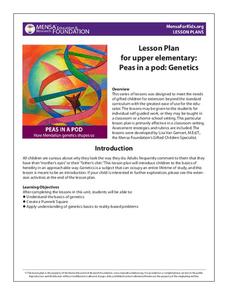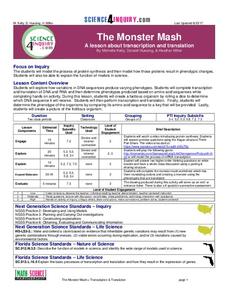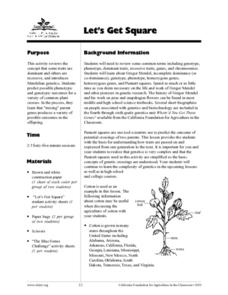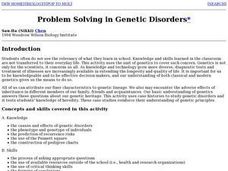Science 4 Inquiry
Genetics, Genetics, and More Genetics: Exploring Independent Assortment and Non-Mendelian Genetics
Two individuals share 99.9 percent of their genetic codes, yet diversity is observed everywhere. Young scientists learn about diversity through hands-on activities and an experiment. They apply the concepts of independent assortment and...
University of Colorado
Punnett Squares with Piebald Deer
Explore the science behind Earth's amazing diversity of life with this lesson on genetics. Looking at specific traits in piebald deer, carnations, and roan cattle, young scientists use Punnett...
Serendip
Evolution and Adaptations
Survival of the fittest isn't just for the movies! A five-part lesson explores several different species with known adaptations and analyzes them for their survival strategies. Using both video and research data, scholars draw...
Science 4 Inquiry
Monster Mash-Up of Genetics
It's alive! Young mad scientists create monsters as they explore the probabilities of genetic traits during a well-structured inquiry activity. Pairs travel from station to station, rolling the dice and adding traits to their creations...
Virginia Department of Education
Passing Traits to Offspring
What makes each one of us unique? Lead your class in this exciting and educational activity as you uncover traits that show how each individual is different from another. Pupils explore facts about DNA technology and predict the...
Beyond Benign
Kitten Creation
Your pupils become geneticists as they create cat offspring. The next lesson in a series continues an exploration of genetic makeup as scholars consider parent traits to build their offspring. Using household items, they create kittens...
Agriculture in the Classroom
Design 'Y'er Genes
How do changes in DNA affect an organism? Scholars explore chromosomes, genes, DNA, and mutations by modeling the DNA of a strawberry. They build a DNA model, then manipulate it to show how changing the genes transforms the strawberry...
Curated OER
Super Hero Genetics
Students explore the concepts of phenotypes and genotypes. In this genetics lesson students work together to pick a superhero and determine the traits of the offspring.
Curated OER
Natural Selection: Exploring the 'Ohi'a Common Garden
Seventh graders examine natural variation by visiting the Ohi'a Common Garden in Volcano, Hawaii. In this natural selection lesson, 7th graders study background information about phenotypes, genotypes, and phenotypic plasticity before...
MENSA Education & Research Foundation
Peas in a Pod: Genetics
Can peas have grandparents? Learn about inherited traits and heredity with a set of activities focused on Mendelian genetics. As your class learns about the process of passing traits along in Punnett squares, they take on the role of...
Howard Hughes Medical Institute
Got Lactase? The Co-Evolution of Genes and Culture
Does the human body evolve as quickly as human culture? With a stellar 15-minute video, explore the trait of lactose intolerance. Only about 1/3 of human adults seem to still have the enzyme lactase and therefore, the ability to digest...
Virginia Department of Education
DNA Extraction from Strawberries
Has your class ever been astounded by the complexity of DNA analysis? Have they ever asked why genetic engineering has become so important to our daily lives? Young scientists perform DNA extraction on strawberries and explore how the...
LABScI
Genetic Equilibrium: Human Diversity
Investigate the Hardy-Weinberg Principle to explain genetic equilibrium. The 10th lesson plan of a series of 12 is a laboratory exploration of genetic equilibrium. Your classes use a mixture of beans to model allele and genotype...
Virginia Department of Education
Mendelian Genetics
How did Mendel know which pea plants would demonstrate certain characteristics? Pupils explore the answer this question, among others, as they complete Punnet squares, research dominant and recessive traits, and explore hereditary...
Curated OER
A Sputtering Image
Students explain the role of genes in heredity. In this biology activity, students predict the offspring's genotypes and phenotypes using the Punnett Square. They compute the probability of genotypes and phenotypes.
Science 4 Inquiry
The Monster Mash
Young scientists create monsters by applying their knowledge of transcription and translation. They randomly find the DNA, assign it a codon, and build monsters piece by piece.
Beyond Benign
Lucky Brand Genes: Genetic Traits
Explore single-gene traits in humans. After viewing a video introducing genetic vocabulary, individuals identify their phenotype and possible genotypes of specific traits. They consider both dominant and recessive traits. This is the...
Curated OER
Where Are the Dinosaurs?
Students explore the concept of extinction by studying dinosaurs. In this dinosaur lesson, students distinguish between extinct creatures and those that still exist.
Curated OER
Let's Get Square
Students predict possible phenotypic and genotypic outcomes for avariety of common plant hybrids. They review and explain the characteristics of dominant and recessive traits and explore Mendelian genetics. Students plot the possible...
Curated OER
Comparing Fossils
Students explore early hominid evolution as they analyze bones that share characteristics of both apes and humans. Students compare and contrast key skeletal differences between chimpanzees and humans. In groups, they sort and group a...
Curated OER
Problem Solving In Genetic Disorders
Students explore the causes and effects of genetic disorders. They examine the phenotype and genotype of individuals and predict the recurrenence risks. Students generate a Punnett square and construct pedigree charts.
Curated OER
Mendelian and Non-Mendelian Heredity
Tenth graders discuss their physical features, and why they look the way they do. They listen as the teacher discusses DNA, alleles, and dominant or recessive genes. Students perform an experiment with different colored markers...
Curated OER
Blood Brothers
Learners study the blood characteristics of a number of distinct racial/ethnic groups. They build skills in observation, information gathering and processing. Students experiences strongly reflect the nature and intent of the current...
Virginia Department of Education
Building a DNA Model
It has been decades since the discovery of DNA. Still, activities such building this DNA model allow blossoming scientists to better understand the components that form this overall structure. During this activity, they will also...























